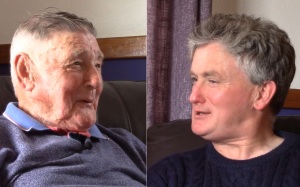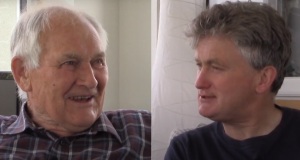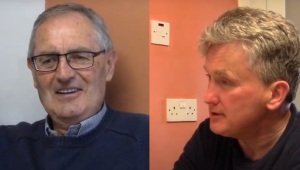Le Gordon Wells
 Rövid dokumentumfilm a Ceòlas skót-gael zenei nyári iskoláról, melyet a Skócia Nyugat Szigeteihez, a Külső Hebrdákhoz tartozó Dél-Uiston rendeznek meg minden évben.
Rövid dokumentumfilm a Ceòlas skót-gael zenei nyári iskoláról, melyet a Skócia Nyugat Szigeteihez, a Külső Hebrdákhoz tartozó Dél-Uiston rendeznek meg minden évben.
Hungarian becomes the nineteenth language in which an Island Voices film is featured, as part of our ongoing “Other Tongues” initiative.
We’re very grateful to László Horváth, a long time friend of the Gaelic language, for this kind and skilful contribution in his own mother tongue.
László teaches at Corvinus University and McDaniel College in Budapest, but he has been involved with Gaelic since he was 15 years old. He has attended several summer schools at Sabhal Mòr Ostaig, where he has lectured in Gaelic and made many friends. He has also written a series of Gaelic articles on Hungarian language renewal for the Gairm periodical. László is currently teaching his students in Budapest from Istanbul, where he is staying with his Turkish wife, Sinem. Still, somehow he managed to find time to send through to us a Hungarian version of the original commentary. Mòran taing, a László!
His chosen film is the documentary from the original Series One about the Ceòlas music summer school held annually in South Uist. It aims to integrate traditional music and dance in a community setting. It has strong links with tutors from Cape Breton in Canada, where old styles of Scottish fiddling and stepdancing have been maintained. The school attracts students from around the world.
As usual, a wordlinked Clilstore transcript – with the film embedded – is also available. You can find it here: https://multidict.net/cs/9092
Tadhail air Island Voices – Guthan nan Eilean
Powered by WPeMatico

 Μια ταινία μικρού μήκους για το κέντρο ημέρας Craigard στο Lochmaddy, στα Δυτικά Νησιά της Σκωτίας. Πρόκειται για ένα μέρος, όπου πολλά άτομα περνούν δημιουργικά και ευχάριστα το χρόνο τους.
Μια ταινία μικρού μήκους για το κέντρο ημέρας Craigard στο Lochmaddy, στα Δυτικά Νησιά της Σκωτίας. Πρόκειται για ένα μέρος, όπου πολλά άτομα περνούν δημιουργικά και ευχάριστα το χρόνο τους. Valentini still works for the same group, offering support in public relations, and has been involved in various other European projects. She’s always enjoyed this work because of the opportunities it’s offered to meet people of other cultures, who speak other languages, and who have other ways of thinking.
Valentini still works for the same group, offering support in public relations, and has been involved in various other European projects. She’s always enjoyed this work because of the opportunities it’s offered to meet people of other cultures, who speak other languages, and who have other ways of thinking. Twitter hashtags do not normally attract much attention from Island Voices, far less participation or amplification. Firestorms and pile-ons are not our normal digital habitat. Rather, our natural inclination is more towards common sense than confected indignation or online mass hysteria. But every now and then, one catches the eye –
Twitter hashtags do not normally attract much attention from Island Voices, far less participation or amplification. Firestorms and pile-ons are not our normal digital habitat. Rather, our natural inclination is more towards common sense than confected indignation or online mass hysteria. But every now and then, one catches the eye –  It’s this additionality that balanced bilingualism, or indeed multilingualism, confers that Island Voices has been promoting from the start. A project founded upon transnational European co-operation is never going to accept a characterisation of its linguistic roots as somehow blinkered or introspective, or that it is motivated by selfish concerns for “cosa nostra” alone. Island Voices would not even have started, with its roots going back to the POOLS project of 2005-2007, without the support of European funding and partners from many different language backgrounds. We hope our response has been, and continues to be, appropriately reciprocal too, for example through our
It’s this additionality that balanced bilingualism, or indeed multilingualism, confers that Island Voices has been promoting from the start. A project founded upon transnational European co-operation is never going to accept a characterisation of its linguistic roots as somehow blinkered or introspective, or that it is motivated by selfish concerns for “cosa nostra” alone. Island Voices would not even have started, with its roots going back to the POOLS project of 2005-2007, without the support of European funding and partners from many different language backgrounds. We hope our response has been, and continues to be, appropriately reciprocal too, for example through our  Mary Robertson is another well-known Benbecula resident, here talking to fellow Baoghlach Archie Campbell for the
Mary Robertson is another well-known Benbecula resident, here talking to fellow Baoghlach Archie Campbell for the  St Kilda, UNESCO-Welterbestätte im Nordatlantik, ist für viele Schottlandbesucher ein Traumziel. Der Kurzfilm berichtet über eine Gruppe von Tagesausflüglern, die vom natürlichen und kulturellen Reichtum des abgelegenen Archipels in ihren Bann gezogen werden.
St Kilda, UNESCO-Welterbestätte im Nordatlantik, ist für viele Schottlandbesucher ein Traumziel. Der Kurzfilm berichtet über eine Gruppe von Tagesausflüglern, die vom natürlichen und kulturellen Reichtum des abgelegenen Archipels in ihren Bann gezogen werden. Our translator and narrator for this film is Volker Labitzke. A keen traveller who has visited many places all over the globe, he found his paradise in the Outer Hebrides where he moved from Germany more than 10 years ago.
Our translator and narrator for this film is Volker Labitzke. A keen traveller who has visited many places all over the globe, he found his paradise in the Outer Hebrides where he moved from Germany more than 10 years ago. Moving on to Benbecula this month we feature Alec MacPhee from Nunton – Baile nan Cailleach – in our regular spotlight on contributors to
Moving on to Benbecula this month we feature Alec MacPhee from Nunton – Baile nan Cailleach – in our regular spotlight on contributors to 

 Happy Birthday to Alasdair Crois Mòraig!
Happy Birthday to Alasdair Crois Mòraig! We continue our exploration of the North Uist cluster in
We continue our exploration of the North Uist cluster in